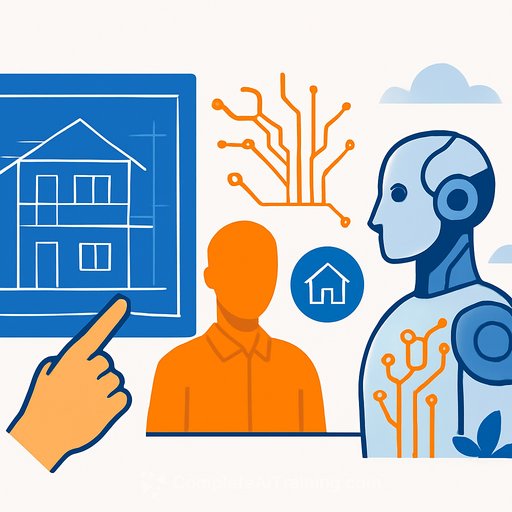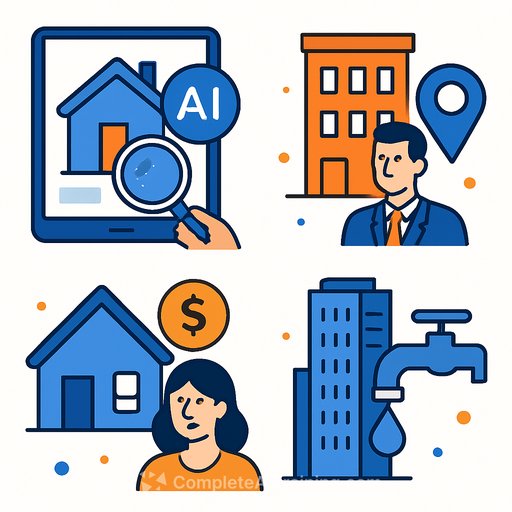From bricks to clicks: the technology rebuilding property
Real estate is finally getting serious about digital. A wave of Israeli-founded PropTech companies is setting a new pace for how assets are built, leased, and managed across global markets.
PropTech applies software, data, and automation to the full asset lifecycle. Standout examples include Buildots in construction control, Caps For Sale in predictive underwriting, and Home Made in tech-enabled lettings. These teams are shipping tools that developers, operators, and capital markets can use today.
Why Israel? Two passions, one industry
Ely Razin, chief strategic investments officer at OurCrowd: "Israelis love to invest in real estate ... then Israel's other passion - tech businesses - kicks in to bring great innovation to these markets."
Razin sees particular strength in AI and fintech: smarter decisioning for investing, AI for construction to cut errors, and fintech for payment flows and fund management across complex capital stacks.
Buildots
What it is: An AI and computer-vision platform that acts as a mission control room for construction execution. It processes site imagery from 360-degree hardhat cameras and other sources, compares progress against the 3D model and schedule, and flags the actions that keep programs on track.
Impact: Users report eliminating avoidable delays by up to 50% on major projects. Teams get an objective, real-time view of status and risk so leaders can direct attention where it moves the needle.
Where it's used: Hundreds of projects across residential, commercial, hospitals, data centres, battery plants, and semiconductor labs. Clients include Intel (also an investor), and in the UK: Wates, Sir Robert McAlpine, Kier, Multiplex, and IHP.
Footprint and funding: HQ in London with offices in Tel Aviv and Chicago, plus presence in France and Germany. Raised $166m from Lightspeed, Viola, Qumra Capital, Intel Capital, TLV Partners, Future Energy Ventures, OG Venture Partners, MAOR Investments, and others. buildots.com
The industry challenge: CPO Aviv Leibovici points to supply chain disruption, labour shortages, and rising complexity from assets like data centres. The result: demand for efficient, data-driven execution.
Adoption reality: "Optimising the build phase is still manual and data-poor," says Leibovici. Resistance exists, but the value is clear as teams see objective data driving better daily decisions.
Role in digital property: Moving from reactive fixes to predictive management that anticipates delay cascades, prioritises interventions by projected impact, and aligns stakeholders on a single data set. Buildots is investing in an enterprise platform to connect data across the project lifecycle and portfolios.
Trends to watch: Deeper tech integration across planning, execution, and operations; AI-led decisioning; and a construction boom in data centres and infrastructure that requires precision management.
What's next: A Portfolio Dashboard that standardises portfolio-wide views with AI-driven insights and early risk signals. The focus is on performance-led portfolio management, healthier margins, and fewer surprises.
Caps For Sale (CFS)
What it is: Predictive analytics for real estate underwriting. CFS models tenant stickiness, vacancy risk, and asset performance to speed decisions and reduce mispricing, starting with retail: single-tenant and neighbourhood centres.
Why it matters: Investors are pricing risk with the same tools they used decades ago. CFS gives deal teams a faster, data-backed edge on renewals, voids, and downside protection.
Footprint and funding: Founded in 2023 by brothers Ari and Aaron Segal. Based in Israel with a global team, focused on the US, with early UK conversations (including British Land and Landsec) and a collaboration with Time Retail Partners. Raised $500k from angels; currently raising $3m to scale data, sales, and product. cfsnnn.com
The industry challenge: CEO Ari Segal sees a gap between fast-moving capital markets and slow underwriting cycles. Weeks-long spreadsheets mean missed opportunities and mispriced risk.
Adoption reality: Relationships drive real estate. New tech must prove itself in live deals. CFS focused on underwriting that delivers returns and converted early sceptics through results.
Role in digital property: Moving the market from data access to actionable insights that let managers "see around corners" and act with conviction.
Trends to watch: ML-driven underwriting becoming standard, firms leveraging proprietary data moats, capital demanding tech-enabled diligence, and potential tokenisation that enables faster trading.
What's next: A self-service SaaS platform for mid-market funds, a pilot with a major CMBS underwriting group, and tools for void analysis, re-tenanting, site selection, and portfolio-level asset management.
Home Made
What it is: A fully integrated, AI-enabled lettings platform that replaces fragmented processes with a central operating system for residential leasing. It covers marketing, viewings, compliance, and move-in, improving performance at lower cost than traditional agents.
Impact: The UK's leading multifamily leasing provider, increasing asset values by five-30% through data-led operations and scalable workflows.
Footprint and funding: Founded in 2018 by Asaf Navot. Based in London, serving the UK residential rental market with institutional partners including major build-to-rent operators, banks, listed groups, and asset managers. Raised £6m from a leading VC and family offices. home-made.com
The industry challenge: Navot calls out inertia-legacy systems and providers resist change while renter expectations rise and inefficiency gets pricier. The answer is digital operations backed by data.
Adoption reality: The product must be superior, but change management is the hard part. Once partners see outcomes, adoption accelerates.
Role in digital property: An infrastructure layer for modern residential lettings, enabling a seamless, data-driven experience from lead to lease.
Trends to watch: AI and automation across pricing, yield, compliance, and communications; hyper-personalised renter experiences; and ESG moving to the core of strategy and tooling.
What's next: UK expansion with institutional landlords, new renter tools, and deeper AI to drive performance. The mission: make renting better, safer, and fairer for all parties.
What this means for owners, developers, and managers
- Make execution measurable: instrument the build phase with computer vision and model/schedule comparison. Start with one live project and a clear delay-reduction KPI.
- Upgrade underwriting: combine internal lease, footfall, and trade area data with ML models for renewal probability and void risk. Use scenario outputs to speed IC decisions.
- Consolidate lettings ops: move to a single leasing OS across marketing, viewings, compliance, and move-in. Set targets for time-to-lease, rent uplift, and cost per let.
- Connect portfolio data: standardise data definitions across projects and assets; build dashboards that surface early risk and benchmark performance by segment.
- Focus on change management: assign an internal sponsor, pilot with strong operators, and tie incentives to measurable outcomes (delay days saved, renewal lift, OpEx reduction).
Helpful references and next steps
For teams driving BIM adoption across capital projects, see the UK government's BIM guidance: Building Information Modelling (BIM).
If your staff needs AI fundamentals for underwriting, portfolio analytics, or site operations, explore practical learning paths here: Complete AI Training: courses by job.
Company sites for deeper product detail and demos: Buildots | Caps For Sale | Home Made
Your membership also unlocks:





